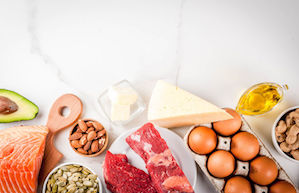For all the talk about Banting, Paleo and Keto diets, there’s also confusion – for while all three entail cutting back on carbohydrates and eating more fats and proteins, there are key differences between them.
Looking to slim down? View our range of supplements here.
Let's look at the Paleo diet
With the Paleo way of eating, the idea is to follow the diet of our early hunter-gatherer ancestors, on the theory that our bodies haven’t evolved much. This means having free-range meat (preferably ostrich or game) and eggs, wild fish, locally-grown organic vegetables, fruits, seeds and nuts, and natural oils like avocado, olive and coconut.
Nothing processed is included – no cereals, wholegrains or lentils (which we ate only once we began cultivating crops), no dairy (which dates to our becoming herders), and no sugar (except from unrefined sources like honey and maple syrup). Paleo is about more than diet – it’s about a natural lifestyle that includes exercise and mindfulness, and is environmentally friendly.
The pros of the Paleo diet
"It encourages eating more vegetables and fruit (which contain antioxidants, vitamins and minerals vital for health), and cutting out added sugars and salt", says Jessica Bacon, a registered dietitian in Cape Town. The high protein content can help you feel full for longer, and build strong muscles and healthy bones. Avoiding refined sugars and additives helps reduce obesity and the likelihood of developing diseases such as diabetes.
The cons of the Paleo diet
Cutting out food groups can be harmful, say she and many other dietitians. Our calcium requirements are quite high, especially for women, and excluding dairy can leave us struggling to get enough. In addition, a diet high in protein has been linked to a raised risk for various cancers and worsening of kidney conditions. The long-term effects of eating this way are still uncertain.
What is the Banting diet?
This is another low-carb, high-fat variation, focused on organic meat (fatty as you like), fish, eggs and nuts, with an emphasis on whole, unprocessed foods. Banters are directed to a green food list (“eat to hunger”), an orange list (“exercise self-control”), a light red list (“hardly ever”) and a red list (“never ever”). You eat vegetables, but unlike on Paleo, mostly only leafy (low starch) ones, and can have dairy, but no (or very little) fruit or sugar. Focus is on achieving ketosis: when your body is deprived of carbohydrates and so burns fat instead for energy.
The pros of the Banting diet
You lose weight fast at the start (the diet was first written about by William Banting, an obese undertaker who used it to trim down). With no sugar, your blood pressure is expected to improve.
The cons of the Banting diet:
“Everyone needs fat, but the type and quantity are important – a range of 20-35% is considered safe,” says Bacon. There are risks associated with cutting back carbohydrates, especially whole grain high-fibre ones, fresh fruits and a wide variety vegetables.
Looking at the Keto diet
With this, the focus is purely on achieving ketosis by adjusting your intake of carbs (to just 5-10%), protein (to 10-30%) and fat to a high 60-80%, derived from whole, unprocessed foods. Keto doesn’t have an associated lifestyle or ideology. High-fat dairy is encouraged (butter, heavy cream, unsweetened full-fat yoghurt), and soy foods like soya beans, tofu and tempeh.
The pros of the Keto diet
Your calcium needs will be well met; and there can be rapid weight loss.
The cons of the Keto diet
It restricts rich sources of carbohydrates, such as starchy vegetables, most legumes, most fruits and grains. “Carbs add palatability and variety to our diet and contain important fibre, vitamins, minerals and phytonutrients,” says Johannesburg registered dietitian Ria Catsicas. There are concerns that high fat consumption can increase risk of heart disease. And the diet, and so the weight loss, may not be sustainable, she says: “Adherence is a problem”.
What do dieticians have to say about these diets?
The Association for Dietetics in South Africa has noted that “current best scientific evidence does not support an extreme low carbohydrate diet”. The preferred dietary patterns that are being recommended internationally and here, it says, include “a variety of whole grains, fruit, vegetables, nuts, legumes, healthy oils, proteins such as lean meat and seafood, and reduced intake of red and processed meats, salt and sugar-sweetened beverages”.
IMAGE CREDIT: 123rf.com

